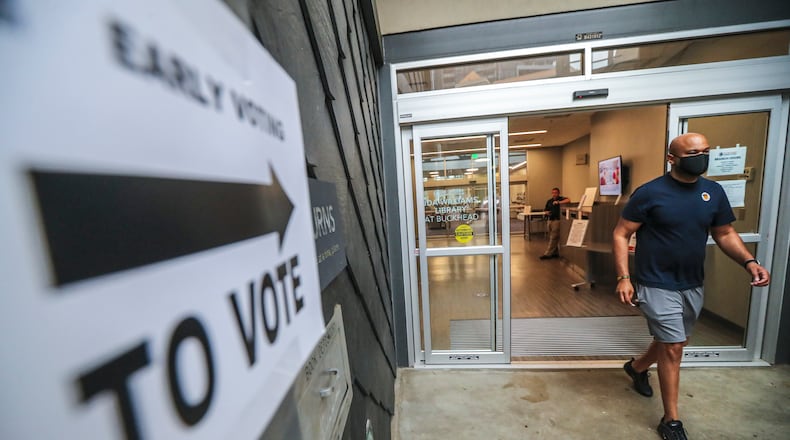Court battles over the 2020 election in Georgia are finally resolved, but judges are still wrestling with more than two dozen lawsuits over voting rights.
The cases include challenges to Georgia’s new voting law, efforts to replace the state’s voting system and litigation over alleged problems in the 2018 election for governor.
The legal disputes set up a contentious election year when voting access and election integrity will be at the forefront of campaigns.
These lawsuits remain after a judge dismissed the last major case involving the 2020 presidential election. The judge threw out a lawsuit seeking a deep inspection of absentee ballots to search for fraud after investigators found none.
Here’s a look at some of the more prominent pending voting cases in Georgia that could be decided before the 2022 elections:
Georgia’s new voting law
Nine federal lawsuits seek to overturn parts of Georgia’s 98-page, Republican-backed voting law, passed along party lines in March in response to the 2020 election.
The lawsuits, including a case by the U.S. Department of Justice, oppose absentee voter ID requirements, ballot drop box limitations, provisional ballot rejections and a ban on volunteers handing out food and water to voters waiting in line.
The cases allege that the law, Senate Bill 202, makes it harder for voters to cast their ballots, especially Black voters who used absentee ballots at higher rates than white voters and are less likely to have the types of voter ID sought by the state.
So far, a judge ruled against one part of the law, rejecting the law’s broad prohibition on photographing filled-out ballots. The ruling allows voters, election observers, journalists and the public to photograph or record ballots during recounts or audits, but it remains illegal to photograph completed ballots in polling places while voting is underway.
Attorneys for the state have filed motions to dismiss the cases, saying Georgia’s voting laws are nondiscriminatory and ensure greater voting access than several other states run by Democrats.
Voting machines
A federal judge is considering a four-year-old case that’s seeking to replace Georgia’s voting touchscreens with paper ballots filled out with a pen.
The plaintiffs in the case allege that touchscreen computers are vulnerable to tampering or hacking that could alter the outcomes of elections. They want in-person voters to use hand-marked paper ballots instead of ballot-marking devices that print out paper ballots with votes embedded in QR codes.
State election officials have said Georgia’s $138 million voting system, purchased in 2019, is secure. They say multiple safeguards protect the system from interference, and there’s no evidence that election results have been altered.
A separate lawsuit that also opposes the voting system was recently filed in Fulton County Superior Court.
Claims from the 2018 election
A far-reaching lawsuit filed by Fair Fight, the voting rights organization that Democrat Stacey Abrams founded after her loss to Republican Brian Kemp in the 2018 governor’s race, is moving closer to a resolution after a judge threw out many of its claims earlier this year.
The case originally took issue with voter registration removals, ballot cancellations, poll worker training, long lines and voting equipment.
But after a judge ruled against much of the case, only a handful of complaints remain.
The case now involves narrow allegations about Georgia’s “exact match” voter registration policy, voter list accuracy and absentee ballot cancellation procedures. Attorneys for the state have asked the judge to grant summary judgment in their favor before the case reaches a trial.
More court challenges
A hearing is scheduled for November in a lawsuit that opposes at-large elections for the five seats on the Public Service Commission. The case alleges that electing PSC members statewide denies Black voters an opportunity to elect their preferred candidates.
The state of Georgia is appealing a recent ruling that reduced the number of signatures needed for Libertarian and other third-party candidates to get on the ballot for U.S. House races. A federal judge ordered Georgia to lower its signature requirement to 1% of registered voters for third-party candidates running for nonstatewide offices.
One case that sprung from the 2020 election seeks to block an election watchdog group, True the Vote, from trying to disqualify voters by questioning their residency. The lawsuit alleges that True the Vote, which unsuccessfully challenged the eligibility of 364,000 voters last year, is engaging in voter intimidation in violation of the Voting Rights Act.
About the Author
Keep Reading
The Latest
Featured





